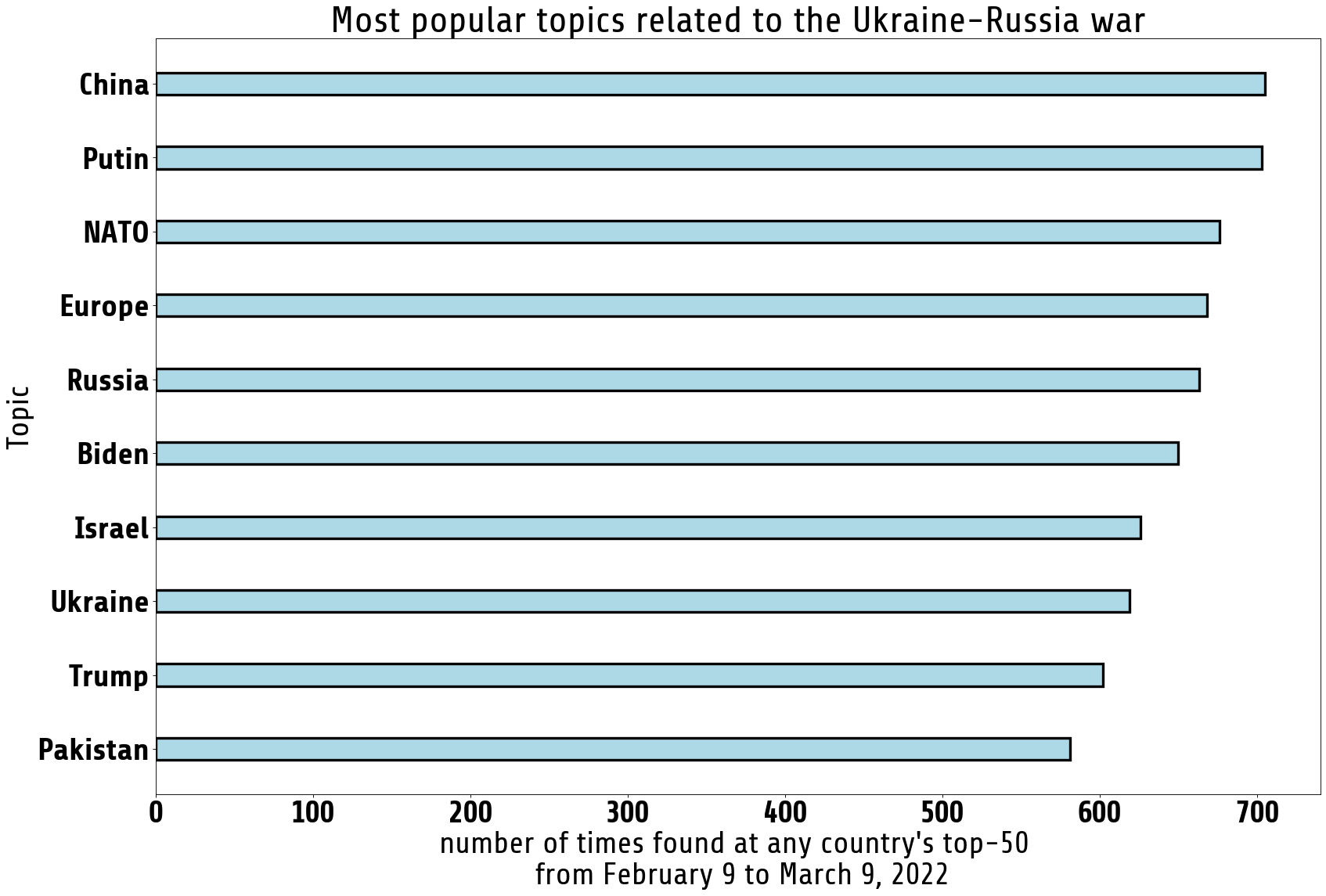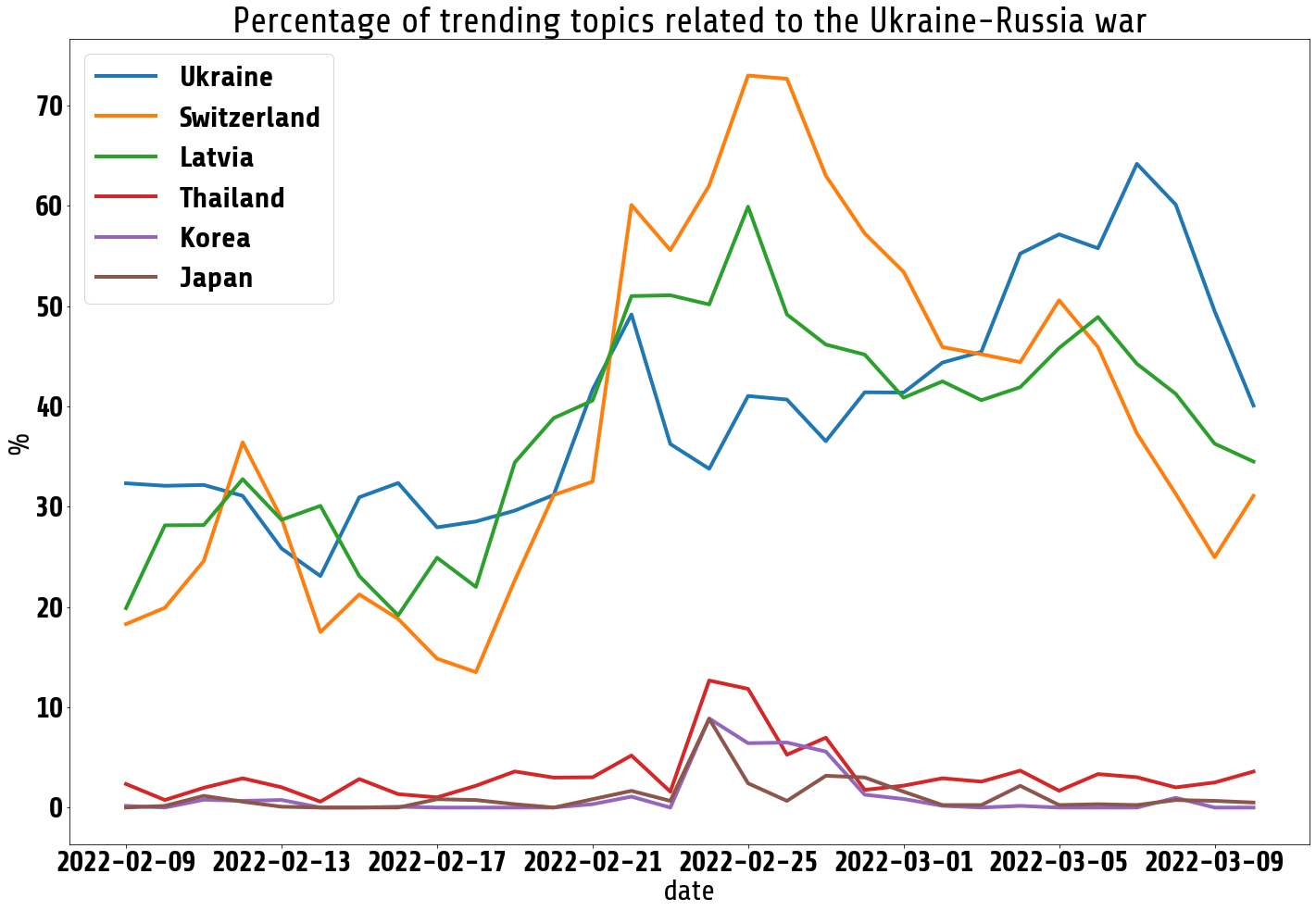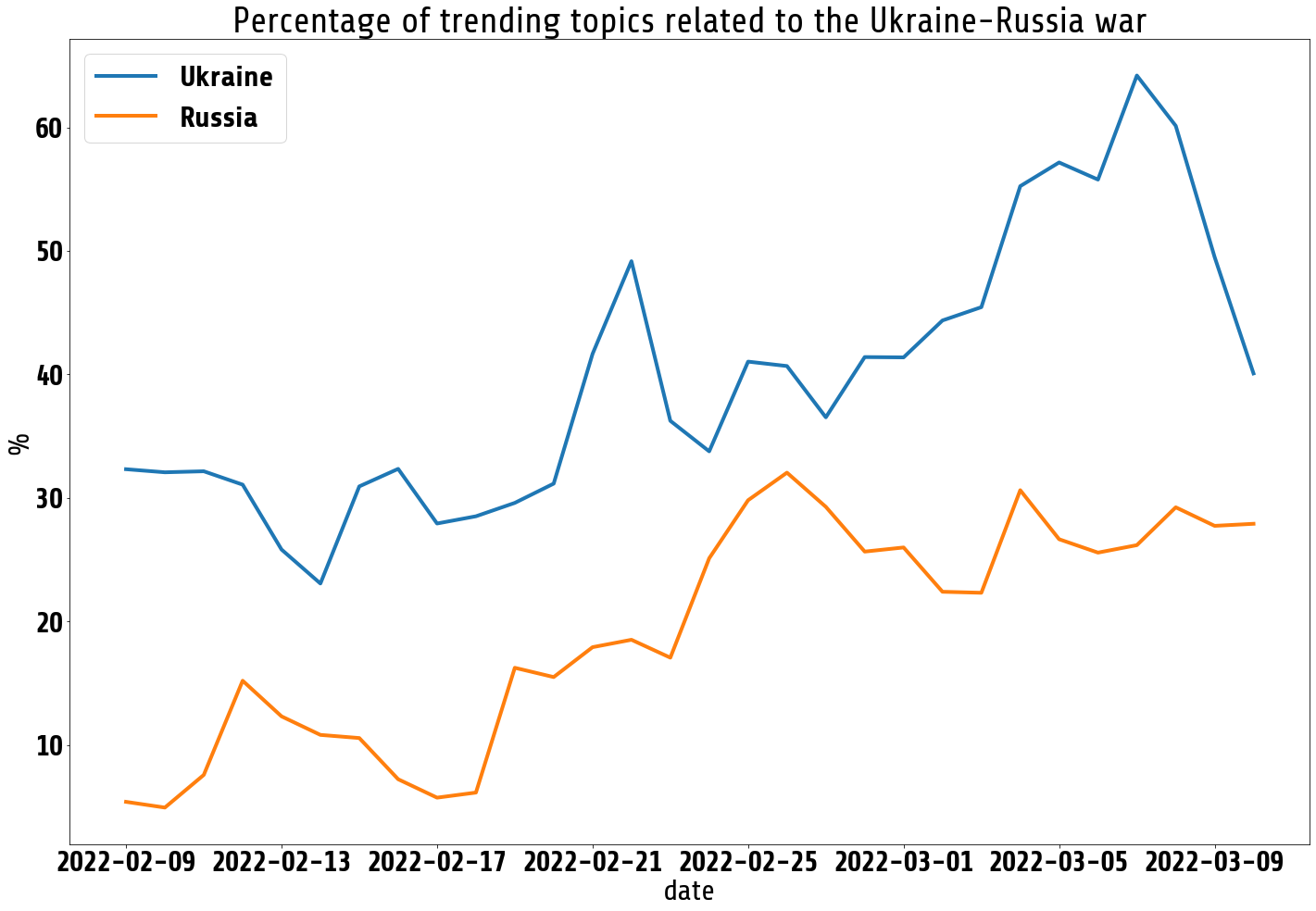Exactly on February 24, 2022, Russia started a military invasion of Ukraine, a conflict with serious implications around the world: from a migration crisis in Europe, to carrying risks for the world economy. From a Twitter trends perspective, this event has been shaping a great part of people's opinions since the beginning of the year, and we'll analyze that in this post.
In this post, we are going to analyze the behavior of the trending topics related to the Ukraine-Russia war and find how Twitter users have reacted to this event.
Since the day of the invasion was February 24, we'll analyze what was happening on Twitter 2 weeks before the invasion and 2 weeks after the invasion, so we'll work with around 30 days of data and we'll focus on answering the following questions:
- What have been the most popular topics?
- Which countries have had more trending topics related to the Ukraine-Russia war?
- How have been changing the popularity of this topic on Twitter trought time?
In addition to knowing the most popular topics and knowing what countries have been talking the most about this event, answering these questions is going to give us an idea of how countries have been aware of this conflict and how this awareness has been changing through time.
The Data
Since the day of the invasion was February 24, we'll analyze what was happening on Twitter around 2 weeks before the invasion and around 2 weeks after the invasion.
We collect data from Twitter every hour. The data we collect are the top-50 trending topics for every country around the world (62 countries and many other towns), and we add additional information to a good part of these trending topics, such as categories they belong to and entities. The latter refers to related "things" to any trending topic, for instance: for a trending topic "Kyiv", depending on what's people tweeting, we'll probably find that "Russia" and "NATO" are two mentioned entities (or "things"). We use this information to filter out the trending topics related to the Ukraine-Russia war by including every trending topic in which the entities: Ukraine, Joe Biden, Vladimir Putin, NATO, or Volodymyr Zelensky are mentioned.
If you want to know a bit more about the data we collect, we have this blog post in which we talk about it a bit more.
So, now that we know what we have, we are ready to analyze this data.
What have been the most popular topics?
The first thing we want to know is what have been the most popular topics related to the Ukraine-Russia war. To do this we are going to count every time we find a trending topic related to the Ukraine-Russia war in any country. For example: on February 10 at 10:00 we collected the top-50 trending topic for every country. Since we track 62 countries, we could have up to 3100 completely different trendings topics collected, but that's never the case, usually countries take trending topics from each other. So, in that particular frame of time, we had 2628 different trending topics from which 221 trending topics were related to the Ukraine-Russia war. So in the end, we count all these appearances, and basically what we have is the total hours in which trending topics turned out to be at the top-50 in at least one country.

From February 9 to March 9 we have 720 hours, and the topics China and Putin appeared at the top-50 in at least one country 720 times, it means, they never stop being a trend. In the list, we also have other topics such as NATO, Europe and Russia that have been quite popular as well.
Which countries have had more trending topics related to the Ukraine-Russia war?
Now that we know what have been the most popular trending topics, we want to know what countries have had more trending topics related to the Ukraine-Russia war. This information will give us an idea of how aware have been every country of this war.
What we do in this case is to calculate the number of trending topics related to the Ukraine-Russia war per hour per country, and this calculation is summarized in the following figure.

In the top of the figure, we have the 10 countries with more trending topics related to the Ukraine-Russia war, and we can find that Ukraine, Switzerland and Latvia are at the top. Down the list, we find the countries that have had fewer topics about the Ukraine-Russia war, and we can find countries like Japan, Corea and Thailand (note: countries with a big population of Twitter users, such as the United States, Brazil, and Japan, tend to have new trending topics every hour, in other words, their top-50 is somewhat volatile. That explains why is Japan at the tail of this list. We'll analyze that in another post).
So, now that we know what countries have had more and fewer trending topics related to the Ukraine-Russia war, let's compare the top-3: Ukraine, Switzerland and Latvia, and the last 3: Japan, Corea and Thailand per hour. But in this case, let's analyse the percentage of trending topics related to the Ukraine-Russia in their top-50 instead. The results are presented in the following figure.

Interesting to notice that February 24 was the day with more trending topics related to this war, and we can see an increase in all these countries. Something even more interesting is that Switzerland was the country with more trending topics related to this conflict the days around the day of the invasion. We can also notice that the only curve that has been increasing steadily through time has been Ukraine's, the rest have had quite similar behavior with a notable increase exactly on February 24.
We could think that Ukraine's trending topics have been very different because it is a country that is directly involved in this war, and it makes sense. So let's compare this behavior with Russia and see if they also have a similar curve.

Here we can see that Russia's curve of popularity is different as well. It seems that after the invasion, Russian Twitter users have been more active on Twitter talking about the war, but days before the invasion it doesn't seem to be an interesting trending topic among users, at least not quite interesting in comparison with Ukraine, Latvia or Switzerland.
Finally, and to finish this analysis with another interesting visualization, let's see a time lapse map with the total number of trending topics related to the Ukraine-Russia war per country. Here it's important to notice two important dates:
- February 22, 2022: Vladimir Putin recognizes the independence of the Donetsk and Luhansk People's Republics
- February 24, 2022: Russia's invasion started
We can notice that on those two important dates, Twitter users from all over the world were more active talking about the conflict, but just days after, Twitter users in some countries stopped being that active.
Summary
To conclude this work, let's list the most interesting insights we found out of this analysis:
-
The top trending topics related to the Ukraine-Russia war are: China, Putin and NATO.
-
Countries with more trending topics related to the Ukraine-Russia war are Ukraine, Switzerland, and Latvia.
-
Countries with fewer trending topics related to the Ukraine-Russia war are Japan, Corea, and Thailand.
-
Ukraine's Twitter users have been steadily increasing their number of trending topics related to this war.
-
Russia's Twitter users started to be more active on this conflict right after the day of the invasion
-
February 22 and February 24, 2022, were the days with more activity related to this conflict

